Mortalitasi (Mor-Tal-Li-Ta-Si)
A Mortalitasi, is a specialized priest of the Fifth Dogma, who's tasked with ensuring the correct, and final passing of mortals to their afterlife. The mortalitasi are considered as an important part of Vintian society and culture and are often involved in politics, and are arguably the the most important members of the Maestri Consigali of the various noble houses of the Vintian Imperium.
Career
Qualifications
Anyone who wishes, or was designated to become a mortalitasi, must first be a cleric, a paladin or a wizard who is well versed in in their field and in the Fifth Dogma. The nature of the role also requires a knowledge of the mechanics of anima, magic and death. Prior knowledge in necromancy is not strictly necessary but does provides an advantage over absolute beginners.
Career Progression
Mortalitasi begin their career as apprentices of another, often of their own house. It is common for new trainees to train under a different house, either as part of an alliance, a contract, or simply if their house lack the necessary knowledge or facilities.
During the time of the Infernal Storm it was customary for apprentices to study for 7 years, escort their tutor to Vintia to participate in the Viam Mortis and return as fully fledged mortalitasi.
The practice was changed considerably following the 70th Viam Mortis. With the the introduction of two Imperial Decrees in 1299: Terra Di Vida and 1336: Veneratia Di Historia the initiation of new Mortalitasi no longer tied directly to the handling of errand spirits around the Wizards' Trail, but to the handling of their house's crypts.
While in the past new Mortalitasi were only sanctioned by a special Congress summoned yearly by the Queen of Vintia, now the title can be given to any person of noble birth who studies under a mortalitasi who is employed by the Famiglie Imperiali.
There is no further career progression for a mortalitasi, save for if a member of his house ascends to the throne, in which case the most senior of the family's mortalitasi will become one of her Maestri Fidati.
Perception
Purpose
The mortalitasi prime responsibility is to ensures their family members souls can reach their appropriate afterlife. Alongside this duty however, the mortalitasi is also charged with other tasks, duties and privileges. Some of those duties are purely cultural while other serve more practical, sometimes instrumental aspects of Vintian politics.
The Imperial Decree of 862: Mortalitasi introduced the Mortalitasi as an Imperial sanctioned professionals and described the rules of interactions with them. The entire protocol includes hundreds of different ethics and formalities, but the most basic of which sum up to the following:
A mortalitasi must never be intentionally harmed, must never be abandoned while in need and must never be refused to acompany any traveler while traveling on a road, as long as the traveler is not a serving member of the legions, in which case both should attempt and avoid contact with one another.
Mortalitasi who enters an establishment that provides lodging must receive free lodging for up to 3 days, with a single full meal and two mugs of ale or other beverage of equivalent supply or value each day. If the mortalitasi arrives at a private homestead of any kind they must be allowed at least one night of lodging, but no food or drink needs to be offered.
Mortalitasi swear a lifelong service to single house, renouncing their former house and joining the new one. This includes existing or unfulfilled marriages, children, inheritance and anything else that is associated with their former house. They can not marry back to their former house and may never sire any more children.
A mortalitasi's sacred duty is first and foremost to the living. They must never employ the dead as a tool of offense or aggression. They may never raise, resurrect or revive another mortal without their consent or those who swore Mortalis Permisima. A mortalitasi must always favor the living, even if by doing so he risks the souls under his protection.
Finlay, and perhapse the most difficult one, the mortalitasi must take the vow the Mortalis Permisima themselves, as they leave all their former gods behind in favor of singular service to the Raven Queen.
Social Status
While not owning many physical possessions themselves, mortalitasi often enjoy from great benefits. Being spiritual guides of the paths to afterlife, they are often trusted with moral secrets that wouldn't be shared even with the Spymaster. The ability to commune with the willing dead to an extent is also a great source of knowledge. This makes the mortalitasi one of the most powerful, if not the most powerful members of their house Maestri Consigali.
The position often comes with a lavish standard of living. Most nobles, especially those of the Famiglie Imperiali, invest heavily in their family's crypts and necropolises, often with private garden surrounding a sizable mansion above it for the mortalitasi to live in. Special clothes are also often tailored for each mortalitasi, with the aim of making them stand out in the crowd.
Mortalitasi are protected by a special political standing, and can only be judged by the Justicia Di Imperiali or the Queen of Vintia. Harming a mortalitasi is considered a crime again the living, and is punishable by Voidness.
Demographics
Almost all mortallitasi, even those serving the lower nobility, predominantly originate for the Famiglie Imperiali. This means that while anyone can be trained to become one, most mortalitasi are either humans or half elves.
History
The original Mortalitasi were a group of necromancers operating from the Roxmore Planes. During the The Vintian Crusades they often helped escort refugees from Lake Kadia to City of Darseras. While these escorts usually included the enslavement of the refugees, the involved contracts were generally considered fair and much more trustworthy than those others. One key feature that gave the mortalitasi an edge over other groups was the fact its members swore to keep the Mortalis Permisima, and would always follow through on their promise.
During the lingering death, queen Lucille Von Arris sanctioned the mortalitasi into the law with the Imperial Decree of 862: Mortalitasi after they promised to help the Imperium divine a solution for the problem. It is believed that all the mortalitasi living around Lake Kadia have migrated south around this time.
Training of new mortalitasi won't start until 885, when the first mortalitasi where trained for the members of the Famiglie Imperiali. The profession proved popular, and in high demand as nobles wished to ensure their passing into the afterlife. Their oath of service to the living and practicing of the Viam Mortis were put in place to ensure that most roads of the Imperial Lands received some coverage and generally became safer to travel.
By the first millennium the mortalitasi have been rooted into Vintian culture to such extent that nearly every noble house would train their own or at least employ one. They became integral part of the nobility and of Vintian society as a whole.
The Imperial Decree of 1299 and the Imperial Decree of 1336: Veneratia Di Historia further cemented the mortalitasi's position of power by removing some of the limitations and allowing the training of new ones outside of the queen's court. These Decrees were followed by wave of newly trained mortalitasi, as now each house could open their crypts and necropolises for training. While there are claims, even from the mortalitasi themselves, that the overall quality of their ranks has dwindled somewhat, their political power only increased. The opening of the profession to the public, and the robust legislation that was put in place, ensured the profession's existence as it is today.
Operations
Tools
Mortalitasy use their own spellbooks, as most of their rites and spells are far too complex and amorpheos to be handled by any production spellbook. Each motalitasi creates their own tome, and no two are ever the same, as even copying the spells from master to pupil requires some freeform and adjustments.
The rites of the mortalitasi are a closely guarded secret. Each construct their own, often needlesly complicated rituals, with fake lines and runes ment to confuse or outright misslead the spying competitors. The practice is generally well understood, yet the methods remain unique to each practicier.
Contrary to popular belief, the use philacteries is not required to store a mortal's soul. Whle helpful in perserving the soul as it leaves the body, it is used mostly for convenience and safety. The mortalitasi stores each soul he cares for in a magicaly sectioned part of their sych. The prosess is extremely invasive, both for the host and the guest, and if not done with extreme care it will be resulted in a Mindmeld. An average mortalitasi can carry up to 4 different souls in his care, with especially talented onse capable of carrying up to 10. It is also common for the mortalitasi to retain some core memories of the souls in their care.
Provided Services
Every mortalitasi who finishes their training must journey trough the Wizard's Trail and reach the Great Wall of Vintia where they will serve in the Deadguard for a time period of a single year and up to their entire lifetime, depending on their oaths.
Mortalitasi are also the conductors of funerals, memorials and other event dedicated to the deceased. They are also trusted to execute the last will and testaments of the deceased, as well as dealing with any arrangments that were left unfullfiled before their passing.
To the living, the mortalitasi serves as a spiritual guide for the paths of the afterlife, and would often be confined by members of their family with mortal dillemas or phylosophical disputes that are to be kept hidden from the rest of the Maestri Consigali and even the entire house. The nature of the mortalitasi's work with the dead, and the knowledge of anccestoral memories, offers a special kind of confidentiality for the living as well.
Dangers & Hazards
Aside from the severe risk of experiencing a mindmeld, the mortalitasi is suceptible to the dangers assosiated with necromancy, such as blindness, physical deformations and other afflictions caused by meddling in the cycle of life and death.
Current Date: 2nd of Latsum, 1572
Alternative Names
Death Cleric
Type
Arcane
Demand
In common service
Other Associated professions
Related Locations
Traditional mortalitasi attire
Often heavily decorated. The adorn mask must always reveal at least one of the eyes. A black diamond ring will be adorn on on the left hand.
Mortalitasi masks
A Mortalitasi's mask will generally never hide the eyes mouth, especially if the mortalitasi is blind. In case of severe disfigurement it is sometimes customary to cover the mouth, yet the eyes must remain visible.





Comments